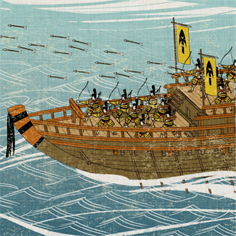
Basic Unit Statistics (can be modified by difficulty level, arts, skills, traits and retainers)
| Recruitment Cost | 350 | |
| Upkeep Cost | 80 | |
| Marines | 60 | 50% |
| Seamen | 10 | 5% |
| Hull Strength | 200 | 2% |
| Morale | 13 | 26% |
Strengths & Weaknesses
- Medium-sized, average speed vessel.
- Crew armed with bows and swords.
- High morale.
- Good range and accuracy.
- Strong in boarding battles.
Abilities
- Battle Speed - This increases a ship's rowing speed for a short period of time.
- Flaming Arrows - This unit can fire flaming arrows for a short period of time. Flaming arrows have a greater damage effect and can set fire to flammable objects. Flaming arrows don't function in wet weather.
- Warcry - Warcry heavily demoralises up to seven nearby enemy units, slowing them down and affecting their defence ability for a short time.
Requires
Description
These ships are well able to handle themselves in battle against similar and smaller vessels.
Attendant medium ships are solid, dependable vessels without any particular weaknesses. Their all-round usefulness, however, means that they are not outstandingly fast: they are a compromise, and like all compromises, excellence in any particular area is sacrificed in the interests of adequacy overall. Their crews are armed with bows and swords, giving them the ability to board enemies or stand off and pepper them with arrows. The crew have good morale, but they are not capable of taking on samurai in an equal or fair fight. A good commander needs to give them every advantage if they are to succeed against samurai. Historically most naval powers have had to build ships that are a compromise between speed, manoeuvrability and combat power. They also have to keep an accountant's eye on the cost of their warships. Usually the end result is a ship that can do most things quite well, but nothing brilliantly. The Japanese were no different in having to address these problems, with an additional one that their fighting men regarded satisfying honour as more important than good seamanship.